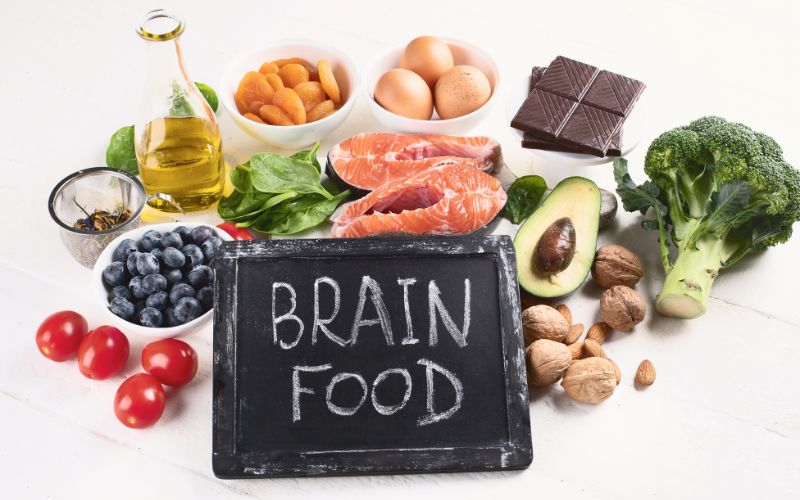Nutrition and Mental Health: Simple Shifts to Support an Anxious Mom Brain

What is the one question that every Mom asks herself every day (and that everyone else asks her)?
“What are we having for dinner tonight?”
And also, what’s the first thing that goes out the window when we become a Mom? Nutrition. We go from pre-pregnancy cute Instagrammable meals to fistfuls of cheetos and half nibbled banana slices. And then we wonder why we feel like crap. Or maybe we don’t wonder, but we also don’t know how to fix it.
Nutrition plays an enormous role in how we feel. While food isn’t a magic cure for anxiety or any other mental health issue, the way we nourish our bodies has a real impact on mood, energy, and nervous system health. The good news? You don’t need a complicated diet overhaul (in fact, please don’t diet at all) —small, realistic shifts can make a difference.
But first - a Quick Distinction
Notice here that I am using the term “nutrition”, not the word “diet”. Dieting implies that there is something inherently short term that we are “fixing”. Please hear me on this - Your postpartum body does not need fixing. Please do not diet. Please do not shame your body for the enormous transformation that motherhood has taken you through. Your body is a work of miracles and every new curve and bump is worthy of love.
Nutrition is about nourishing yourself. It’s about loving your body through this phase just in the same way that you nourish your baby. So with that in mind… let’s talk food and mood.
The Food–Mood Connection
Our brains and bodies are constantly communicating. What we eat affects blood sugar, hormone regulation, and the balance of neurotransmitters that support our mental health. When those systems are out of sync, our mood and anxiety levels can spike (HELLOOO HANGRYMAMA!) And in the postpartum period our hormones are in need of way more support.
Fun fact, did you know that within the first 48 hours of birth you go through the hormonal equivalent of puberty all over again? So yeah, we need to feed ourselves and be mindful of what we are putting into our bodies.
But with motherhood comes stress. Which can often lead to long stretches between meals, skipped snacks, and caffeine overload, all of which lead to spikes in mood dysregulation.
Stabilizing Blood Sugar to Calm Anxiety
When we don’t eat all day, or we don’t eat enough, sudden drops in blood sugar can mimic anxiety symptoms like dizziness, irritability, or a racing heart. Keeping your blood sugar steady can help your body feel more balanced. Breastfeeding also makes you ridiculously hungry which can lead to you running to the cabinets and shoving cookies inyour mouth that eventually lead to a crash in energy.
So what can we do about it?
- Put someone else in charge of your nutrition (at least for the first few weeks). Meal prepping before baby arrives, asking for a meal train, nominating your husband to cook for you (no,not TV dinners please), or hiring a chef are all options for you to take this off your list.
- Have a meal planner written out (again, remember someone else can take this job!) so that you know what meals are being made.
- Pair carbs with protein or fat (apple + nut butter, crackers + cheese). Having the right food on hand can go a long way in reducing crashes.
- Keep quick snacks handy in your diaper bag or car.
Key Nutrients That Support a Calming an Anxious Brain
Certain nutrients are especially supportive when it comes to calming the nervous system:
- Magnesium: Known as “nature’s relaxer.” Found in spinach, pumpkin seeds,and dark chocolate—> *Immediately runs to grab fistful of chocolate covered almonds.
- Omega-3s: Support brain function and reduce inflammation. Found in salmon, chia seeds, walnuts.
- B Vitamins: Important for energy and stress regulation. Found in eggs, whole grains, leafy greens.
- Protein: Stabilizes blood sugar and supports neurotransmitters. Found in meat, beans, tofu, yogurt.
- Broth: One of the best things you can keep in your pantry/ fridge is a good quality bone broth. You can either buy one from a grocer like Whole Foods or you can make your own. Here is the recipe.
The Role of Hydration and Caffeine
I’m sure all of us have seen the meme orown the t-shirt that says “I run on caffeine”. Coffee, matcha and tea have become a ubiquitous tie to mothers.. But too much caffeine can mimic or worsen anxiety symptoms.
- Hydration matters: Dehydration increases fatigue, irritability, and brain fog. Water is your BFF. Get yourself a cute water bottle (or two) and make sure that thing is filled throughout the day.
- Caffeine balance: Try switching slowing down your caffeine intake to 1 or 2 cups a day and replacing your other beverages with herbal teas, water with fruit, or bubbly water.
OK Bridget, I get it, but how do I do this with ZERO time and energy????
I get it girl. I’ve literally been there. Start small:
- Keep calming teas (like chamomile or lemon balm) stocked.
- Prep one “go-to” snackstation in your fridge with cut veggies, hummus, or cheese sticks.
- Add one nutrient-richfood a day instead of cutting things out.
- Set timers on your phone to remind yourself to eat.
- If you are cooking, keep the recipes simple. Try this book for more suggestions on easy postpartum meals.
Supporting your mental health through food doesn’t have to be complicated. By making small, intentional shifts, you can help your brain and body feel more steady—even on the most overwhelming days of motherhood.
✨As part of my integrative therapy approach, I help moms look at the whole picture—mind, body, and soul. If you’re curious about how therapy can support your anxiety and overall well-being, book a free consultation.
